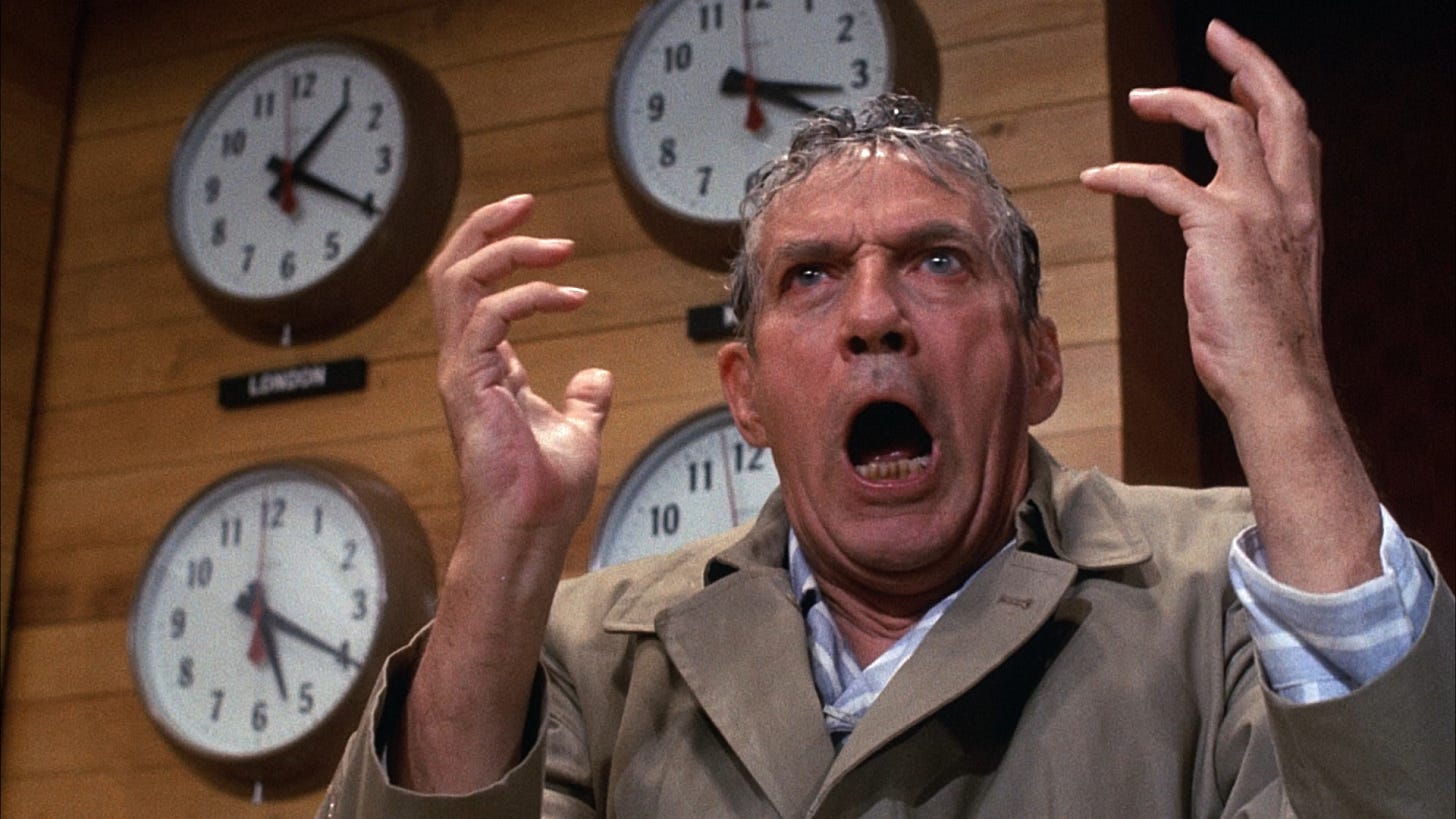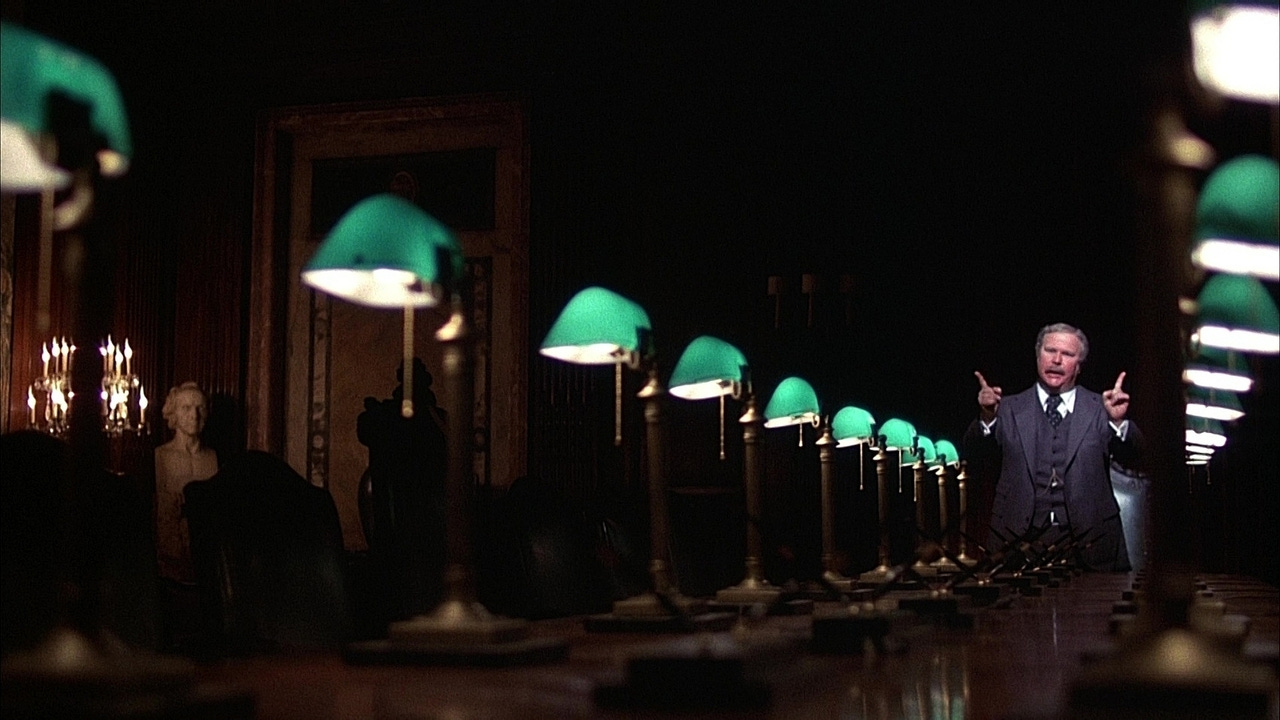“I’m as mad as hell, and I’m not going to take it any more”
It was a scream of despair, a plea for help - but to a television network, it was gold. In the chaotic, messy, yet ragingly prophetic satire Network (1976), Sidney Lumet and Paddy Cheyefsky work together to create a masterpiece that warns against the commodification of emotion and the warping of truth and pain into profit by the television industry. Nearly fifty years later, the film’s message still rings strikingly true - perhaps now more than ever.
The Prophecy of Howard Beale
At the start of the film, the viewer is introduced to Howard Beale, a once highly regarded news anchor at UBS whose career has fallen into irrelevance as his ratings have plummeted. His despair culminates when he is fired from the network by the head of the news department Max Schumacher, who also just so happens to be his best friend. Beale turns to alcohol and despair, and the very next night goes on live television to announce he is going to kill himself. It is a moment of great vulnerability and despair, yet the studio only sees it as an opportunity for something apparently greater than journalism: attention.
In his on-air declaration of suicide, Howard bitterly jokes, “…we ought to get a hell of a rating with that, a fifty share easy”. What begins as a bitter, ironic jab at the network’s obsession with ratings turns out to be frighteningly accurate — his suffering does earn a massive audience, and the network eagerly capitalizes on it. What begins as a shocking moment of raw authenticity quickly devolves into a carefully orchestrated spectacle in order to “boost ratings”. Schumacher allows Beale on the air one last time to exit in dignity, but Beale instead uses that opportunity to “yell bullshit for two minutes”, as Director of Programming Diana Christensen bluntly puts it.
Christensen proposes the idea of commercializing Howard Beale’s emotional breakouts, creating a whole new “news” show and making his rants a fixture of the nightly lineup. The studio chooses to turn Beale into a prophet, a messianic figure “articulating the popular rage”. What was once a tragedy now becomes strategy. What was once madness is now money.
Beneath it all, there lies a haunting moral question in the world of television - how far is too far?
Diana Christensen - Television Incarnate
If Howard Beale is the prophet of the people, Diana Christensen is the high priestess of television - not of truth or journalism, but rather of spectacle and profit. As the ambitious, cold blooded Director of Programming at UBS, Christensen sees television and the news not as a public good but a product to be engineered, repackaged and sold for the highest possible price. Her character serves as a symbol and an allegory for the industry itself.
In the later half of the film, Max Schumacher becomes emotionally involved with Christensen and even leaves his wife to move in with her, despite her taking away all control of his news program and turning it into a large studio show spewing whatever will sell to the audience. Eventually, Max realizes that she is unable to love him or show any real emotion. In the climactic argument as Max is moving out, Max says to Diana, “There’s nothing left of you I can live with”, and later says, “You are television incarnate, Diana, indifferent to suffering, insensitive to joy. All of life is reduced to the common rubble of banality”.
Max’s words cut directly to the core of what Network is really about. Diana is not just a ruthless executive, she is a product of the system that values sensation over substance, and ratings over reality. Her emotional emptiness is not coincidental - it is an essential part of her success.
Arthur Jensen and the Religion of Capitalism
As the chairman of the conglomerate that owns UBS, Arthur Jensen only appears in one major scene - but it is the film’s true climax. After Howard Beale begins to preach ideas openly against the corporate interests of his own network and breaks up a deal with the Saudi Arabians, he is summoned to a dark, cathedral-like boardroom where Jensen delivers a monologue that is not only mesmerizing, but holds one of the core ideals of the film’s message that is highly relevant even today.
“There are no nations! There are no peoples! There are no Russians. There are no Arabs! There are no third worlds! There is no west! There is only one holistic system of systems, one vast and immane, interwoven, interacting, multi-variate, multi national dominion of dollars! Petro-dollars, electro-dollars, multi-dollars! Reichmarks, rubles, rin, pounds and shekels!”
“There is no America. There is no democracy. There is only IBM, and ITT, and AT&T, and DuPont, Dow, Union Carbide, and Exxon.”
To Jensen, nations are obsolete. Ideology is irrelevant. The world is ruled not by governments or gods, but by the flow of capital. He presents this reality not as a dystopia, but as a natural order that must be obeyed. “The world is a business,” he proclaims, his voice echoing through the shadowy hall. And to Beale, once a prophet of rage and rebellion, this sermon becomes gospel.
“I have seen the face of God!”
What makes Jensen’s monologue so powerful and urgent is not just the content that is in it, it is the execution and delivery that elevate it to the next level. The dark lighting of the room with Jensen at the far end of the table, looming large over the scared and frail Howard Beale, gives the scene extra power. Sidney Lumet uses tricks such as these throughout the films to portray different power balances, ideologies and messages.
This scene marks a turning point for Beale. Once furious and impassioned with the messianic ideals of revolution, he returns to the show beaten down by the ideals of Arthur Jensen. He parrots Jensen’s sermon to the audience, warning them against dehumanization and a world they can no longer change. With this, Beale loses all his value as an entertainer - and with it, loses all his value as a human. When Beale no longer stirs outrage, when he no longer fuels ratings, his fate is sealed. Only days later, the head studio executives have Beale killed by a terrorist organization on live television to save their show and to generate as much discourse as possible.
The Mad Prophet, the Machine, and the Message
Yes, Network is a satire - but one so dark, so scathing, and so uncomfortably accurate that calling it a satire almost feels like a disclaimer. Beneath all the absurdity, there lies a terrifying clarity. Howard Beale, Diana Christensen, Max Schumacher, Arthur Jensen - they are not just characters, they are symbols and archetypes. Beale is the human soul in crisis, crying out in despair, desperate to be heard and seen. Diana is the machine that packages that soul into thirty seconds segments. Max is the lifeline that tries and ultimately fails to save these people from their fates. And Jensen is the system itself that feeds on and destroys all of them.
What Network ultimately shows us is that in a world ruled by profit, even madness has a price. Howard Beale is exploited for his pain and suffering, elevated to the status of a prophet and a messiah, and discarded without a second thought when he no longer serves a purpose. The tragedy is not just what happens to Beale - it’s that no one around him ever really sees him as a human being.
This is the heart of Network’s warning: when profit becomes the guiding force of information, entertainment and even human emotion, the truth will always come second to spectacle. And once outrage becomes a product, sincerity becomes impossible.
Nearly fifty years later, we are living in the world Network foresaw—an age of viral outrage, monetized trauma, and news as performance. Howard Beale’s primal scream has echoed into the digital age, multiplied by a billion voices across social media, each algorithmically sorted for engagement. But while the means of exchange and spread of information have changed, the system has not.
In the end, Network isn’t just a film about television. It’s a film about us—about what we choose to watch, what we choose to believe, and what we’re willing to trade for the illusion of connection. It’s not just mad prophets we should be worried about. It’s the systems that create them.
And maybe, just maybe, we ought to be as mad as hell, too.
Rating: 10/10







This is really interesting, right up my alley
Sounds like you are ready for “Chinatown.” Summarizing plot is great—the depth comes from metaphor, finding ways to describe how the director used their specific art to evoke the emotion. You begin to do it with Ned Beatty’s character development. Go for it next level on all of it.
Also, the actors themselves bring their craft. Why is Christensen like no other woman on screen we have seen before? Fay Dunaway is immaculate in her delivery of what a woman had to do to be at The Top in a man’s world. What did she bring that another actress might not?
Finally, the writing. Chayefsky is like no other. Watch it multiple times to get the nuance of the script. As a matter of fact, you can even download it and print it or save it onto a file to mark it up. Find out what makes his work tick like a bomb in your head. He makes it look easy. It is not.
Wonderful first foray into your movie career! Learn from the BEST. We are fortunate to have this kind of film still available. Your love of this kind of storytelling is what we need in cinema, again.